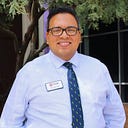Reflecting on a grandfather’s service and his why
When I see a military photo of my grandfather, I wonder why he chose to enlist. I see him looking straight at the camera, head slightly tilted. Flag flying behind him, and the only words to be read say U.S. Navy.
Tata Abram enlisted in 1943 when he turned 18. Most young men at that time, and at that age enlisted. Maybe they thought it was the right thing to do in a time when the world was fighting for the survival of what was right and the extinction of what was wrong.
Now, eighty years after the Normandy landing on June 6, 1944, there remains a lot of wrong in the world, and still right worth fighting. Tata Abram wasn’t one of the thousands that invaded during the Normandy Operation. He was serving on a different war front, on another adventure less deadly. For that, I am grateful.
On this weekend of reflection, 27 years after he was laid to rest, Tata Abram’s service is still somewhat a mystery. Many grandfathers didn’t talk about their service. What they saw and what they did was almost too much to retell, to share with people for whom they cared too much.
It must be difficult to hang on to trauma. To not want to burden others with it. The greatest generation managed to see the worst in humans and to hang on to it. When they returned, they had to hang on to it. To settle back into the regularity of everyday life. To get married. To have a family. To wake up and work every day. To live a life of routine, and not of survival.
For some, it was too much. They didn’t make it long after the War. It’s understandable. Others coped in ways that made life a living hell. And others, like my Tata Abram, managed to re-center their lives on others.
When we think of the liberty, the freedom that was given to others at the cost of our own, we forget that the cost was greater than the numbers we read about in books and museum exhibits. A lost life is also a broken family. A broken family is a wounded community. When communities hurt, we all feel the pain.
Tata Abram shared few details about his own sacrifice during the War. He didn’t lose his life, but he must have left something behind. Scars and wounds that we can’t see. An innocence and a beginning shaped and ended after going through battle.
We only know our grandfathers as old men. They kind of guys that move a little slower because they are at the end of a long marathon. We know them as looking a little tested, a little broken from battle. They value us because what they did all those years ago helped us be here for them to value.
What we don’t know about them is who they were before they became men in a faraway places, seeing and doing the kinds of things that make men out of you whether you are ready for the change or not. We don’t know what might have become of them if they didn’t enlist. We don’t know if we are the people that they were before going to war.
I don’t know as much as I would like about Tata Abram, but I do know enough to know that he and others like him are heroes worth knowing about. They were selfless and courageous. They were young, and they were ready to take on the unimaginable.
They were Americans.
